|
Books Should Be Free Loyal Books Free Public Domain Audiobooks & eBook Downloads |
|
|
Books Should Be Free Loyal Books Free Public Domain Audiobooks & eBook Downloads |
|
Top Authors |
|---|
|
Book type:
Sort by:
|
By: A. Novice | |
|---|---|
 The Anglican Friarand the Fish which he Took
The Anglican Friarand the Fish which he Took
| |
By: A. P. (Andrew Price) Morgan (1836-1906) | |
|---|---|
 The Myxomycetes of the Miami Valley, Ohio
The Myxomycetes of the Miami Valley, Ohio
| |
By: A. P. Mukerji | |
|---|---|
 The Doctrine and Practice of Yoga
The Doctrine and Practice of Yoga
| |
By: A. Russell (Alexander Russell) Bond (1876-) | |
|---|---|
 The Scientific American Boy Or, The Camp at Willow Clump Island
The Scientific American Boy Or, The Camp at Willow Clump Island
| |
By: A. S. M. (Arthur Stuart-Menteth) Hutchinson (1879-1971) | |
|---|---|
 This Freedom
This Freedom
| |
 Once Aboard the Lugger
Once Aboard the Lugger
| |
By: A. S. M. Hutchinson (1879-1971) | |
|---|---|
 If Winter Comes
If Winter Comes
If Winter Comes, was in many aspects ahead of its time, dealing with an unhappy marriage, eventual divorce, and an unwed mother who commits suicide. According to the New York Times, "If Winter Comes" was the best-selling book in the United States for all of 1922. | |
By: A. Stanley Blicq | |
|---|---|
 Norman Ten Hundred A Record of the 1st (Service) Bn. Royal Guernsey Light Infantry
Norman Ten Hundred A Record of the 1st (Service) Bn. Royal Guernsey Light Infantry
| |
By: A. T. (Albert Ten Eyck) Olmstead | |
|---|---|
 Assyrian Historiography
Assyrian Historiography
| |
By: A. T. (Andrew Taylor) Still (1828-1917) | |
|---|---|
 Philosophy of Osteopathy
Philosophy of Osteopathy
| |
By: A. T. Anderson (?-?) | |
|---|---|
 How to Do Chemical Tricks
How to Do Chemical Tricks
While a bit outdated in many of the more complex descriptions of several of the phenomena described, this book is nonetheless still fun and relevant for a person interested in basic chemistry or physics tricks, and the devices built in the book can be easily replicated with more modern materials. The book is split up into many little experiments, tricks, with an explanation on how it works, what's happening, and how to reproduce the effects at home. | |
By: A. T. Thomson (1797-1862) | |
|---|---|
 The Wits and Beaux of Society Volume 1
The Wits and Beaux of Society Volume 1
| |
 Memoirs of the Jacobites of 1715 and 1745. Volume I.
Memoirs of the Jacobites of 1715 and 1745. Volume I.
| |
 The Wits and Beaux of Society Volume 2
The Wits and Beaux of Society Volume 2
| |
By: A. W. (Alfred Wilks) Drayson (1827-1901) | |
|---|---|
 Adventures of Hans Sterk The South African Hunter and Pioneer
Adventures of Hans Sterk The South African Hunter and Pioneer
| |
 Sporting Scenes amongst the Kaffirs of South Africa
Sporting Scenes amongst the Kaffirs of South Africa
| |
 The White Chief of the Caffres
The White Chief of the Caffres
| |
By: A. W. (Andrew Woods) Williamson (1838-1905) | |
|---|---|
 The Dakotan Languages, and Their Relations to Other Languages
The Dakotan Languages, and Their Relations to Other Languages
| |
By: A. W. Bitting (1870-1946) | |
|---|---|
 Ketchup
Ketchup
The Bittings have written a number of books on canning and home preparation of food. This short volume includes a brief description of the preparation and production of ketchup, primarily from commercial production view, and then a more scientific treatment of this condiment and its ingredients. Note: The last section in the book is titled "Structure of the Tomato". In fact, it is devoted to microbiological examination of pulp and ketchup. | |
By: A. W. Dimock | |
|---|---|
 Dick in the Everglades
Dick in the Everglades
| |
By: A. W. Duncan | |
|---|---|
 The Chemistry of Food and Nutrition
The Chemistry of Food and Nutrition
| |
By: A. W. Fulton | |
|---|---|
 Home Pork Making
Home Pork Making
| |
By: A. W. [Editor] Latham | |
|---|---|
 Trees, Fruits and Flowers of Minnesota, 1916Embracing the Transactions of the Minnesota State Horticultural Society,Volume 44, from December 1, 1915
Trees, Fruits and Flowers of Minnesota, 1916Embracing the Transactions of the Minnesota State Horticultural Society,Volume 44, from December 1, 1915
| |
By: A. Woodward | |
|---|---|
 A Review of Uncle Tom's Cabin or, An Essay on Slavery
A Review of Uncle Tom's Cabin or, An Essay on Slavery
| |
By: A.E. | |
|---|---|
 The Hero in Man
The Hero in Man
| |
 The Divine Vision and Other Poems
The Divine Vision and Other Poems
| |
By: A.E.W. Mason | |
|---|---|
 At the Villa Rose
At the Villa Rose
Harry Wethermill, the brilliant young scientist, a graduate of Oxford and Munich, has made a fortune from his inventions, and is taking a vacation at Aix-les-Bains. There he meets, and immediately falls in love with, the young and beautiful Celia Harland, who serves as companion to the aging but warm-hearted Madam Dauvray of Paris. All this is observed by Julius Ricardo, a retired financier from the City of London, who spends every August at Aix, expecting there to find a pleasant and peaceful life... | |
By: A.H. Beesley | |
|---|---|
 The Gracchi Marius and Sulla Epochs of Ancient History
The Gracchi Marius and Sulla Epochs of Ancient History
| |
By: A.L.O.C. | |
|---|---|
 The Story of a Dark Plot or Tyranny on the Frontier
The Story of a Dark Plot or Tyranny on the Frontier
| |
By: A.M. (Alexander Martin) Sullivan (1830-1884) | |
|---|---|
 The Wearing of the Green, or The Prosecuted Funeral Procession
The Wearing of the Green, or The Prosecuted Funeral Procession
| |
By: A.P. Herbert (1890-1971) | |
|---|---|
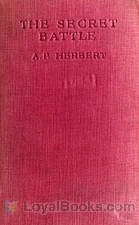 The Secret Battle
The Secret Battle
Like many soldiers at the beginning of their military careers, Harry Penrose has romantic ideas of climbing the ranks and attaining hero status. However, while stationed at Gallipoli, the realities of war begin to take their toll on Penrose, not only physically, but also mentally where the war has become a 'battle of the mind.' This is his story as related by a fellow soldier, as well as the story of the campaign at Gallipoli which is vividly portrayed from the author's own personal experiences.During his tenure as an officer, Penrose slowly asserts himself; the war takes a toll on his personality, but he begins to live up to his early dreams of heroism... | |
By: A.W. Drayson | |
|---|---|
 The Young Dragoon Every Day Life of a Soldier
The Young Dragoon Every Day Life of a Soldier
| |
 The Gentleman Cadet His Career and Adventures at the Royal Military Academy Woolwich
The Gentleman Cadet His Career and Adventures at the Royal Military Academy Woolwich
| |
By: Aaron David Bernstein | |
|---|---|
 Popular Books on Natural Science For Practical Use in Every Household, for Readers of All Classes
Popular Books on Natural Science For Practical Use in Every Household, for Readers of All Classes
| |
By: Aaron Hill (1685-1750) | |
|---|---|
 'Of Genius', in The Occasional Paper, and Preface to The Creation
'Of Genius', in The Occasional Paper, and Preface to The Creation
| |
By: Aaron Merritt Hills (1848-1935) | |
|---|---|
 Life of Charles G. Finney
Life of Charles G. Finney
A.M. Hills, theologian and preacher in the Wesleyan holiness tradition, gives us a detailed biography of Charles G. Finney, one of the most influential revivalists of the nineteenth century. Charles G. Finney was a key figure in initiating the Second Great Awakening in the United States. His preaching was passionate an powerful and his very presence would often bring conviction on those around him. Although his background was Baptist and Presbyterian, he vigorously promoted the doctrine of entire sanctification and the infilling of the Holy Spirit. Finney also left his mark on education as president of Oberlin College in Ohio. - Summary by Larry Wilson | |
By: Aaron Smith (?-1862) | |
|---|---|
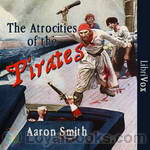 The Atrocities of the Pirates
The Atrocities of the Pirates
In 1822, Aaron Smith, a young English seaman, was taken captive by Cuban pirates when his ship was boarded en route from Jamaica to England. Forced to work as a navigator and as a member of pirate boarding parties, he witnessed unspeakable acts of murder and torture. Befriended by a young Cuban woman, he managed to escape with his life, but was arrested as a pirate in Havana and sent back to England in chains. There, he found himself on trial for his life at the Old Bailey courthouse—with the attorney general himself leading the prosecution. Smith's dramatic account of his personal experience is a brutally honest, unromanticized [sic] look at piracy in the 19th century. | |
By: Abbie Farwell Brown | |
|---|---|
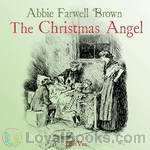 The Christmas Angel
The Christmas Angel
Disagreeable old Miss Terry spends her Christmas Eve getting rid of toys from her childhood toy box. One by one she tosses them onto the sidewalk in front of her house, then secretly watches the little scenes that occur, which seem to confirm her belief that true Christmas spirit does not exist. Then the Angel from her childhood Christmas tree appears to show Miss Terry that she has not yet witnessed the final act of each of those little dramas...Living Age magazine in 1910 observed of The Christmas... | |
 Curious Book of Birds
Curious Book of Birds
Now the interesting facts about birds we have always with us. We can find them out for ourselves, which is a very pleasant thing to do, or we can take the word of others, of which there is no lack. But it is the quaint fancies about birds which are in danger of being lost. The long-time fancies which the world's children in all lands have been taught are quite as important as the every-day facts. They show what the little feathered brothers have been to the children of men; how we have come to like some and to dislike others as we do; why the poets have called them by certain nicknames which we ought to know; and why a great many strange things are so, in the minds of childlike people. | |
 The Flower Princess The Flower Princess; The Little Friend; The Mermaid's Child; The Ten Blowers
The Flower Princess The Flower Princess; The Little Friend; The Mermaid's Child; The Ten Blowers
| |
 John of the Woods
John of the Woods
| |
 In The Days of Giants
In The Days of Giants
This book is made of the stories told by the Northern folk,—the people who live in the land of the midnight sun, where summer is green and pleasant, but winter is a terrible time of cold and gloom; where rocky mountains tower like huge giants, over whose heads the thunder rolls and crashes, and under whose feet are mines of precious metals. Therefore you will find the tales full of giants and dwarfs,—spirits of the cold mountains and dark caverns. You will find the hero to be Thor, with his thunderbolt hammer, who dwells in the happy heaven of Asgard, where All-Father Odin is king, and where Balder the beautiful makes springtime with his smile... | |
By: Abbie Phillips Walker (1867-) | |
|---|---|
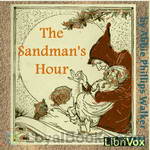 The Sandman's Hour
The Sandman's Hour
Reading bedtime stories to children can be a wonderful way to relax and at the same time act out the exciting things happening in the story for them. If you've done it, you know the feeling and if you haven't I can only hope that you were the rapt audience for such stories when a child. We can let ourselves go and perform all the parts with abandon because the only audience are those who unreservedly appreciate our thespian talents. These 25 stories are all original and all sparkling examples of Abby Walker's ability to spin a witty story that is fun to read and listen to... | |
 Sandman's Rainy Day Stories
Sandman's Rainy Day Stories
A book of sleepy bed time stories for children read for you, no matter what age you are, read to you by talented and wonderful volunteers. - Summary by phil chenevert | |
By: Abbie Walker (1867-) | |
|---|---|
 Sandman's Goodnight Stories
Sandman's Goodnight Stories
Have you every read a bed time story to a child? Or had one read to you? Fun, isn't it? These 28 delightful, short, well written and whimsical stores by the famous storyteller Abby Phillips just beg to be read aloud by adults or children. With titles like THE REVENGE OF THE FIREFLIES and SALLIE HICKS'S FOREFINGER how can you go wrong? Turn on the nightlight, tuck 'em in, settle down in the rocking chair and ... enjoy. | |
By: Abby Frances Friebe (1861-?) | |
|---|---|
 Nomad of the Nine Lives
Nomad of the Nine Lives
Tales of a cat's life told by the cat in hopes of saving cats from death by animal shelters or abandonment. | |
By: Abby Langdon Alger (1850-1917) | |
|---|---|
 In Indian Tents
In Indian Tents
A collection of the legends and stories of North Eastern Indians "In the summer of 1882 and 1883, I was associated with Charles G. Leland in the collection of the material for his book The Algonquin Legends of New England, published in 1884. I found the work so delightful, that I have gone on with it since, whenever I found myself in the neighborhood of Indians. The supply of legends and tales seems to be endless, one supplementing and complementing another, so that there may be a dozen versions of one tale, each containing something new... | |
By: Abby Morton Diaz (1821-1904) | |
|---|---|
 A Domestic Problem : Work and Culture in the Household
A Domestic Problem : Work and Culture in the Household
| |
 The William Henry Letters
The William Henry Letters
| |
 Entertaining Story of King Brondé, his Lily and his Rosebud
Entertaining Story of King Brondé, his Lily and his Rosebud
A lavish palace, a giant, a poor boy seeking his fortune, a beautiful girl in danger... these are all the elements of a charming tale. Spoiled princesses, a robbers' cave and fairies round out this story for children. - Summary by Lynne T | |
By: Abd Salam Shabeeny (fl. 1820) | |
|---|---|
 An Account of Timbuctoo and Housa Territories in the Interior of Africa
An Account of Timbuctoo and Housa Territories in the Interior of Africa
| |
By: Abdullah Ibn al-Muqaffaʿ (724-759) | |
|---|---|
 Fables of Pilpay
Fables of Pilpay
These moralistic stories within stories date back to the Sanskrit text Panchatantra . They were first translated into Arabic by a Persian named Ruzbeh who named it Book of Kalilah and Dimna and then by Abdullah Ibn al-Muqaffa and later Joseph Harris in 1679 and then remodeled in 1818. Max Mueller noted that La Fontaine was indebted to the work and other scholars have noted that Jeanne-Marie LePrince de Beaumont and John Fletcher were both familiar with the fables. The Fables of Pilpay are a series of inter-woven fables, many of which deploy metaphors of anthropomorphized animals with human virtues and vices. | |
By: Abdu’l-Bahá ‘Abbás (1844-1921) | |
|---|---|
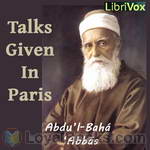 Talks by Abdul Baha Given in Paris
Talks by Abdul Baha Given in Paris
“Much has already been written of the visit of Abdul Baha, Abbas Effendi, to Europe,” writes Lady Blomfield in her Preface to Paris Talks, “During his stay at Paris at 4, Avenue de Comoens, he gave short “Talks” each morning to those who crowded, eager to hear His Teaching. These listeners were of many Nationalities and types of thought, learned and unlearned, members of various religious sects, Theosophists and Agnostics, Materialists and Spiritualists, etc., etc. Abdul Baha spoke in Persian, which was translated into French... | |
 Talks by Abdul Baha Given in Paris
Talks by Abdul Baha Given in Paris
“Much has already been written of the visit of Abdul Baha, Abbas Effendi, to Europe,” writes Lady Blomfield in her Preface to Paris Talks, “During his stay at Paris at 4, Avenue de Comoens, he gave short “Talks” each morning to those who crowded, eager to hear His Teaching. These listeners were of many Nationalities and types of thought, learned and unlearned, members of various religious sects, Theosophists and Agnostics, Materialists and Spiritualists, etc., etc. Abdul Baha spoke in Persian, which was translated into French... | |
 Mysterious Forces of Civilization
Mysterious Forces of Civilization
The Mysterious Forces of Civilization (Persian: Risálih-i-Madaníyyih) is a work written before 1875 by ‘Abbás Effendí, known as ‘Abdu’l-Bahá (the Servant of Bahá) (1844-1921). The Persian text was first lithographed in Bombay in 1882 and printed in Cairo in 1911. ‘Abdu’l-Bahá was the eldest son and appointed successor of Bahá’u’lláh, the Founder of the Bahá’í Faith. The original text of this work was written and published anonymously, and the first English translation (by Johanna Dawud) was published in London in 1910 and Chicago in 1918, under the title ‘Mysterious Forces of Civilization’ written by "an Eminent Bahai Philosopher... | |
 Traveller’s Narrative Written to Illustrate the Episode of the Báb
Traveller’s Narrative Written to Illustrate the Episode of the Báb
“This book is the history of a proscribed and persecuted sect written by one of themselves,” writes Professor Edward Granville Browne, the Cambridge Orientalist who translated this narrative. “After suffering in silence for nigh upon half a century, they at length find voice to tell their tale and offer their apology. Of this voice I am the interpreter.” This work is the story of the life of the Siyyid ‘Alí-Muhammad-i-Shírází (1819-1850), known as the “Báb”, which is Arabic for “Gate”... | |
 Some Answered Questions
Some Answered Questions
Some Answered Questions was first published in 1908. It contains questions asked to `Abdu'l-Bahá by Laura Clifford Barney, during several of her visits to Haifa between 1904 and 1906, and `Abdu'l-Bahá's answers to these questions. Prominent among the topics are detailed explanations of Christian subjects, including interpretations of chapters 11 and 12 of the Book of Revelation, chapter 11 of the Book of Isaiah, the story of Genesis, and many other subjects. Topics covered include God, Prophets of God, Christian subjects, evolution, the soul, immortality, fate, free will, healing, the non-existence of evil, and reincarnation. (Introduction derived from Wikipedia) | |
 Promulgation of Universal Peace: Vol. I
Promulgation of Universal Peace: Vol. I
“Two years before the crash of world war shook the continents and upheaved oceans,” Howard MacNutt relates. “‘Abdu’l-Bahá ‘Abbás visited the United States of America proclaiming the Glad-Tidings of Universal Peace and the oneness of the world of humanity. In his message he reviewed social, religious and political conditions of the nations, foretold clearly the impending clash and conflict of militarism, summoning mankind to the standard of divine guidance upraised in this cycle of the cycles by the manifestation and teachings of Bahá’u’lláh... | |
By: Abel Boyer (1667-1729) | |
|---|---|
 The Present State of Wit (1711) In a Letter to a Friend in the Country
The Present State of Wit (1711) In a Letter to a Friend in the Country
| |
By: Abel J. (Abel John) Jones (1878-1949) | |
|---|---|
 Rudolph Eucken : a philosophy of life
Rudolph Eucken : a philosophy of life
| |
By: Abigail Mott (1766-1851) | |
|---|---|
 Narratives of Colored Americans
Narratives of Colored Americans
Abigail Mott was a Quaker and abolitionist from New York who, along with fellow Quaker M. S. Wood, has compiled a provocative collection of stories of “Colored Americans.” They range from well-known figures such as Phillis Wheatley and Sojourner Truth to the common men and women who give poignant insights of their life. Selections consist of short anecdotes, essays, stories, letters and poetry. Many have strong religious and spiritual themes. - Summary by Larry Wilson | |
By: Abigail Stanley Hanna | |
|---|---|
 Withered Leaves from Memory's Garland
Withered Leaves from Memory's Garland
| |
By: Abner Cheney Goodell (1831-1914) | |
|---|---|
 The Trial and Execution, for Petit Treason, of Mark and Phillis, Slaves of Capt. John Codman
The Trial and Execution, for Petit Treason, of Mark and Phillis, Slaves of Capt. John Codman
| |
By: Abner Cosens | |
|---|---|
 War Rhymes by Wayfarer
War Rhymes by Wayfarer
| |
By: Abner Doubleday (1819-1893) | |
|---|---|
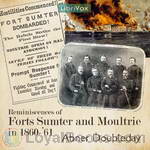 Reminiscences of Forts Sumter and Moultrie in 1860-'61
Reminiscences of Forts Sumter and Moultrie in 1860-'61
Abner Doubleday was a busy man. He rose to be a major general during the American Civil War, started the first cable car company in San Francisco, and is credited (though perhaps erroneously) with inventing the game of baseball.In 1861, he had the distinction as a captain to be second-in-command of Ft. Moultrie, one of the harbor defenses of Charleston, SC.. When that state seceded from the Union, Doubleday and the garrison of artillerists manning the fort were cut off from supplies and reinforcements... | |
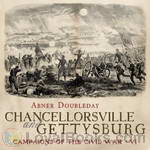 Chancellorsville and Gettysburg
Chancellorsville and Gettysburg
Abner Doubleday began the Civil War as a Union officer and aimed the first cannon shot in response to the bombardment opened on Ft. Sumter in 1861. Two years later, after a series of battles (including Antietam, where he was wounded), Doubleday took over a division in the Army of the Potomac's 1st Corps.These are his memoirs of service in two of the War's great campaigns. At Chancellorsville, a very promising start made by General Hooker against Lee's Confederate forces fell to a defeat when, in... | |
By: Abraam Abraamovich Goulbat | |
|---|---|
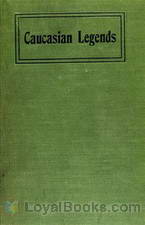 Caucasian Legends
Caucasian Legends
| |
By: Abraham Cahan (1860-1951) | |
|---|---|
 Yekl A tale of the New York ghetto
Yekl A tale of the New York ghetto
| |
By: Abraham Cowley (1618-1667) | |
|---|---|
 Cowley's Essays
Cowley's Essays
| |
 Wish
Wish
LibriVox volunteers bring you 13 recordings of The Wish by Abraham Cowley. This was the Fortnightly Poetry project for February 24, 2013. Abraham Cowley (/ˈkuːli/) was a leading English poet in the 16th century. | |
By: Abraham Lincoln (1809-1865) | |
|---|---|
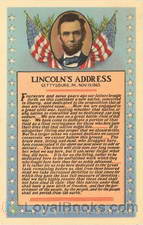 The Gettysburg Address
The Gettysburg Address
Lincoln's Gettysburg Address, given November 19, 1863 on the battlefield near Gettysburg, Pennsylvania, USA Four score and seven years ago, our fathers brought forth upon this continent a new nation: conceived in liberty, and dedicated to the proposition that all men are created equal. Now we are engaged in a great civil war. . .testing whether that nation, or any nation so conceived and so dedicated. . . can long endure. We are met on a great battlefield of that war. We have come to dedicate a portion of that field as a final resting place for those who here gave their lives that this nation might live... | |
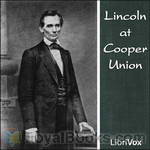 Lincoln at Cooper Union
Lincoln at Cooper Union
On 27 February 1860, Abraham Lincoln gave this address at the Cooper Union in New York City. When he gave the speech, Lincoln was considered by many to be just a country lawyer. After he gave the speech, he soon became his party’s nominee for president. | |
 Abraham Lincoln Writings
Abraham Lincoln Writings
| |
 Speeches & Letters of Abraham Lincoln, 1832-1865
Speeches & Letters of Abraham Lincoln, 1832-1865
| |
 Abraham Lincoln's Second Inaugural Address
Abraham Lincoln's Second Inaugural Address
| |
 Quotes and Images From The Writings of Abraham Lincoln
Quotes and Images From The Writings of Abraham Lincoln
| |
 Abraham Lincoln's First Inaugural Address
Abraham Lincoln's First Inaugural Address
| |
 The Writings of Abraham Lincoln — Volume 1: 1832-1843
The Writings of Abraham Lincoln — Volume 1: 1832-1843
| |
 Lincoln Letters
Lincoln Letters
| |
 The Emancipation Proclamation
The Emancipation Proclamation
| |
 Lincoln's Inaugurals, Addresses and Letters (Selections)
Lincoln's Inaugurals, Addresses and Letters (Selections)
| |
 The Writings of Abraham Lincoln — Volume 4 The Lincoln-Douglas debates
The Writings of Abraham Lincoln — Volume 4 The Lincoln-Douglas debates
| |
 The Writings of Abraham Lincoln — Volume 3 The Lincoln-Douglas debates
The Writings of Abraham Lincoln — Volume 3 The Lincoln-Douglas debates
| |
 State of the Union Address
State of the Union Address
| |
 The Life and Public Service of General Zachary Taylor: An Address
The Life and Public Service of General Zachary Taylor: An Address
| |
 Gettysburg Address 150th Anniversary
Gettysburg Address 150th Anniversary
On Thursday, November 19, 1863, Abraham Lincoln gave a brief address at the dedication of the Soldier's National Cemetery in Gettysburg, Pennsylvania. This speech is now considered one of the greatest in American history and one of the finest examples of English public oratory. To mark its 150th anniversary, Librivox volunteers bring you 15 recordings of the Gettysburg Address. (from Wikipedia and LA Walden) | |
 Emancipation Proclamation
Emancipation Proclamation
After having written and released an initial draft of this proclamation in September of 1862, minor changes were made and Lincoln signed it on January 1st, 1863. It declared free the slaves in 10 states not then under Union control, with exemptions specified for areas already under Union control in two states. Lincoln spent the next 100 days preparing the army and the nation for emancipation, while Democrats rallied their voters in the 1862 off-year elections by warning of the threat freed slaves posed to northern whites... | |
 Noted Speeches of Abraham Lincoln
Noted Speeches of Abraham Lincoln
A few of Lincoln's most famous speeches and the Lincoln-Douglas debate make for historic reading. | |